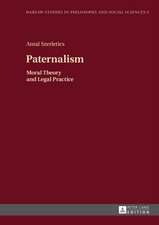Philosophy of Law: Introducing Jurisprudence
Autor Professor Jeffrey Branden Limba Engleză Hardback – 20 noi 2013
| Toate formatele și edițiile | Preț | Express |
|---|---|---|
| Paperback (1) | 186.35 lei 3-5 săpt. | |
| Bloomsbury Publishing – 20 noi 2013 | 186.35 lei 3-5 săpt. | |
| Hardback (1) | 833.47 lei 3-5 săpt. | |
| Bloomsbury Publishing – 20 noi 2013 | 833.47 lei 3-5 săpt. |
Preț: 833.47 lei
Preț vechi: 1066.55 lei
-22% Nou
Puncte Express: 1250
Preț estimativ în valută:
159.52€ • 172.19$ • 133.76£
159.52€ • 172.19$ • 133.76£
Carte disponibilă
Livrare economică 29 martie-12 aprilie
Preluare comenzi: 021 569.72.76
Specificații
ISBN-13: 9781441104847
ISBN-10: 1441104844
Pagini: 312
Dimensiuni: 156 x 234 x 20 mm
Greutate: 0.59 kg
Ediția:New.
Editura: Bloomsbury Publishing
Colecția Bloomsbury Academic
Locul publicării:London, United Kingdom
ISBN-10: 1441104844
Pagini: 312
Dimensiuni: 156 x 234 x 20 mm
Greutate: 0.59 kg
Ediția:New.
Editura: Bloomsbury Publishing
Colecția Bloomsbury Academic
Locul publicării:London, United Kingdom
Caracteristici
Student-friendly organisation around key themes aids understanding of the major theories in philosophy of law.
Notă biografică
Jeffrey Brand is Associate Professor of Philosophy at George Washington University, USA.
Cuprins
PrefaceWebsite1. Aspects of Law and Legal Systems2. Courts and Legal Reasoning3. Making, Justifying, and Evaluating Law4. Law and Individual Obligation5. Private Law6. Criminal Law7. Sentencing and Punishment8. Statutes9. Constitutions10. International LawNotesGlossaryBibliographyIndex
Recenzii
Philosophy of Law: Introducing Jurisprudence is an exceptionally clear, comprehensive, and engaging introduction to philosophy of law. Brand succeeds at doing justice to the complexity of the subject matter while making it accessible. It will be an excellent resource for undergraduate and law school courses in legal philosophy.
Philosophy of Law is a well-written guide to the important ideas and figures providing students with a clear guide to complex material in a useful companion to any legal philosophy course or module.
Jeffrey Brand's Philosophy of Law: Introducing Jurisprudence is a highly accessible, highly engaging, and at the same time fundamentally fair-minded, introduction to a wide-range of legal issues that are at the core of contemporary legal education and practice. It would be an excellent resource for an undergraduate survey course in law, whether as a primary text or secondary text to accompany other primary materials.
Jeffrey Brand has managed to write the best introduction to legal philosophy yet available. The book is sophisticated yet accessible, and the range of issues covered is impressive. Those who read the book will not only learn about legal philosophy's main questions and the position of some of its major figures, but will actually learn how to do legal philosophy by observing the manner in which Brand meticulously crafts arguments and counter-arguments for the competing views. If you are looking for one book to adopt in class, then this is the one, and I certainly plan to use it with my students in Brazil.
Pitched at just the right level to be both accessible and illuminating, master teacher Jeffrey Brand takes the reader on a sure-footed tour of contemporary legal philosophy. Written with the student in mind, it is packed with examples and applications that make clear the importance of the issues it studies. An additional strength is the attention Brand gives to topics that other textbooks tend to shortchange, such as private law, international law, and the ideal of rule of law itself. Highly recommended.
Brand offers an exceptionally clear presentation of an almost encyclopedic list of topics addressed by analytic legal philosophers. These include not only questions concerning law per se - e.g. its nature, the source of its normativity, and its interpretation - but also questions specific to particular areas of law such as criminal law, property and torts, and international law. The organization of the book allows instructors a great deal of flexibility in what they wish to cover, in what order, and in what depth, and enables them to select among the many different connections they might wish to draw between various concepts and arguments. Brand presents students with just the right amount of material on a given topic to spur productive classroom discussion and essays. Reading this book will surely awaken in many students the same passion for doing legal philosophy Brand clearly enjoys.
Jeffrey Brand is a highly original and astute legal philosopher. Teachers seeking a clear and comprehensive introduction to the subject, aimed at undergraduates students, will not easily find a better book than this.
Philosophy of Law is a well-written guide to the important ideas and figures providing students with a clear guide to complex material in a useful companion to any legal philosophy course or module.
Jeffrey Brand's Philosophy of Law: Introducing Jurisprudence is a highly accessible, highly engaging, and at the same time fundamentally fair-minded, introduction to a wide-range of legal issues that are at the core of contemporary legal education and practice. It would be an excellent resource for an undergraduate survey course in law, whether as a primary text or secondary text to accompany other primary materials.
Jeffrey Brand has managed to write the best introduction to legal philosophy yet available. The book is sophisticated yet accessible, and the range of issues covered is impressive. Those who read the book will not only learn about legal philosophy's main questions and the position of some of its major figures, but will actually learn how to do legal philosophy by observing the manner in which Brand meticulously crafts arguments and counter-arguments for the competing views. If you are looking for one book to adopt in class, then this is the one, and I certainly plan to use it with my students in Brazil.
Pitched at just the right level to be both accessible and illuminating, master teacher Jeffrey Brand takes the reader on a sure-footed tour of contemporary legal philosophy. Written with the student in mind, it is packed with examples and applications that make clear the importance of the issues it studies. An additional strength is the attention Brand gives to topics that other textbooks tend to shortchange, such as private law, international law, and the ideal of rule of law itself. Highly recommended.
Brand offers an exceptionally clear presentation of an almost encyclopedic list of topics addressed by analytic legal philosophers. These include not only questions concerning law per se - e.g. its nature, the source of its normativity, and its interpretation - but also questions specific to particular areas of law such as criminal law, property and torts, and international law. The organization of the book allows instructors a great deal of flexibility in what they wish to cover, in what order, and in what depth, and enables them to select among the many different connections they might wish to draw between various concepts and arguments. Brand presents students with just the right amount of material on a given topic to spur productive classroom discussion and essays. Reading this book will surely awaken in many students the same passion for doing legal philosophy Brand clearly enjoys.
Jeffrey Brand is a highly original and astute legal philosopher. Teachers seeking a clear and comprehensive introduction to the subject, aimed at undergraduates students, will not easily find a better book than this.



























